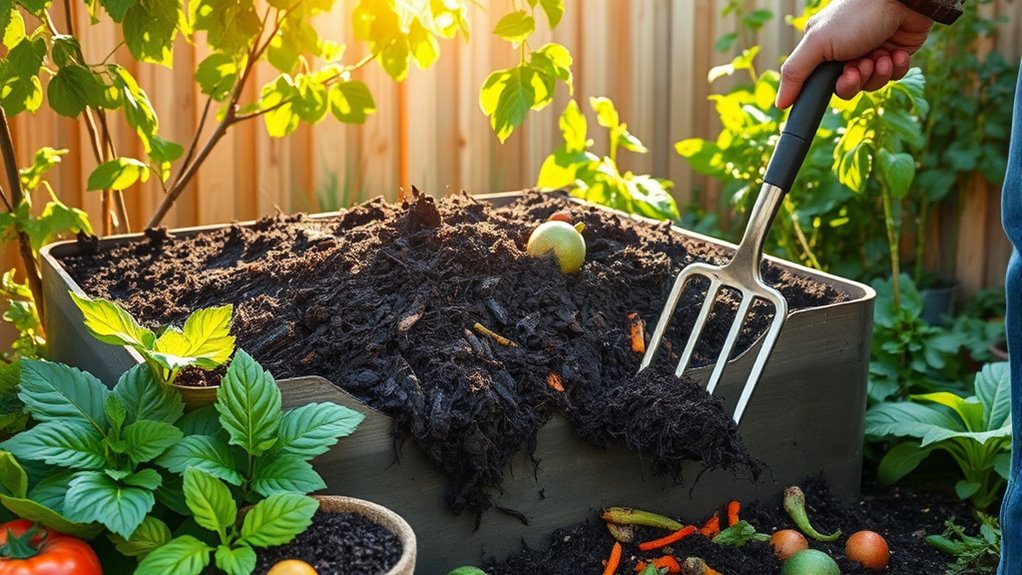To simplify composting for bigger harvests, balance green scraps and brown materials, keeping the pile moist and aerated. Turn your compost regularly to prevent odors and speed up decomposition. Avoid overfeeding worms or adding meats and dairy if vermicomposting. Monitor moisture and oxygen levels, and break down large piles into manageable sections. Staying consistent and patient will boost soil fertility over time, leading to healthier plants. If you continue, you’ll discover more tips to optimize your composting success.
Key Takeaways
- Balance green and brown materials to create nutrient-rich compost that boosts plant growth.
- Maintain proper moisture and aeration to accelerate decomposition and improve compost quality.
- Incorporate vermicomposting to quickly produce nutrient-dense worm castings for larger harvests.
- Regularly monitor and adjust compost conditions to prevent odors and ensure healthy microbial activity.
- Use smaller, manageable compost bins to optimize aeration and speed up the composting process.

Composting might seem complicated at first, but it’s actually a straightforward way to reduce waste and create nutrient-rich soil for your garden. When you start composting, you’re recycling your kitchen scraps and yard waste into valuable organic matter that boosts plant growth. One excellent method to contemplate is vermicomposting, which uses worms to break down organic material. The vermicomposting benefits are significant—you’ll produce high-quality compost faster, and the worms help aerate the pile, preventing odors and speeding up decomposition. Plus, worm castings are packed with nutrients, making your soil more fertile and your plants healthier.
Getting started with composting is simple, but you might encounter some common issues along the way. That’s where composting troubleshooting comes into play. If your compost isn’t breaking down as expected, check the moisture levels; it should be damp but not soaking wet. Too much water can cause anaerobic conditions, leading to foul odors, while too little slows decomposition. If your pile smells bad, it’s likely lacking oxygen—that’s another problem to address by turning or aerating the compost regularly. Remember to balance green materials (like vegetable scraps) with brown materials (like leaves or shredded paper). Too many greens can cause excess moisture and odors, while too many browns slow down the process.
Monitor moisture and oxygen levels to keep your compost healthy and odor-free.
In vermicomposting, you’ll want to keep the worms comfortable by maintaining the right temperature—ideally between 55 and 77 degrees Fahrenheit—and avoiding meat or dairy, which can attract pests or cause odors. If your worms aren’t thriving, check for signs of overfeeding or dryness. Adding shredded newspaper or coconut coir can help balance moisture levels and provide bedding for the worms. Also, ensure your bin isn’t exposed to direct sunlight or extreme cold, as these conditions can stress the worms and halt composting. Regular monitoring and adjustments help keep the process running smoothly.
Another common troubleshooting tip is to keep your compost accessible and manageable. If it becomes too large or unruly, break it down into smaller bins or sections. This makes turning easier and helps you monitor its progress. You’ll also want to be patient; composting takes time, but with consistent effort, you’ll notice your waste diminishing and your soil improving. Over time, you’ll see how simple adjustments—like fixing moisture, balancing materials, or adding worms—can lead to better composting results. With practice, composting becomes second nature, and you’ll enjoy the rewards of a thriving garden with less waste and healthier plants. Understanding composting processes can further enhance your success and efficiency.
Frequently Asked Questions
Can Composting Be Done Indoors Effectively?
Yes, you can compost indoors effectively using indoor bins or compost containers. You just need to choose a well-ventilated container with a lid to reduce odors. Regularly add kitchen scraps like fruit and vegetable peels, coffee grounds, and eggshells. Turn the compost occasionally to speed up decomposition. With proper maintenance, indoor composting is convenient and eco-friendly, helping you reduce waste and produce rich compost for your plants.
How Long Does It Take for Compost to Mature?
Think of compost aging like a fine wine; it takes time to reach maturity. Usually, your compost will be ready in 3 to 6 months, depending on temperature, materials, and maintenance. Compost maturity means it’s dark, crumbly, and earthy, signaling it’s perfect for your garden. Keep turning it regularly, and you’ll see the signs of compost aging, ensuring your soil gets the rich nutrients it needs for bigger, healthier harvests.
Are There Specific Composting Methods for Urban Areas?
Yes, urban composting and balcony composting are popular methods for city dwellers. You can set up a small compost bin in your apartment or on your balcony, using either compost tumblers or bin systems designed for limited space. Turn your waste regularly to speed up decomposition, and guarantee proper airflow and moisture. This way, you’ll produce rich compost while reducing waste and embracing eco-friendly living in your urban environment.
What Are Common Mistakes That Hinder Compost Quality?
Think of your compost pile as a recipe; if you add too much nitrogen, it turns sour, hindering decomposition. Common mistakes include ignoring nitrogen imbalance and neglecting proper aeration, which causes your compost to become compacted and smelly. To keep it healthy, balance greens and browns, turn the pile regularly, and make certain airflow. These steps prevent issues and promote rich, nutritious compost for your garden.
How Do I Compost in Cold or Winter Climates?
In cold weather composting, you should insulate your bin with straw, leaves, or foam to retain heat. Turn your compost regularly to boost decomposition and add compost activators like manure or kitchen scraps to generate warmth. Use winter compost strategies such as keeping the pile in a sunny spot and covering it with a tarp. These steps help maintain microbial activity, ensuring effective composting even in winter.
Conclusion
Now that you know the basics, composting becomes your secret weapon for bigger, healthier harvests. Think of it as planting a seed of success—nurture it regularly, and your garden will flourish like a well-tuned orchestra. Don’t let composting feel overwhelming; instead, see it as a simple recipe that, with a little effort, yields abundant rewards. With patience and consistency, your garden will grow stronger and more vibrant than ever before.










